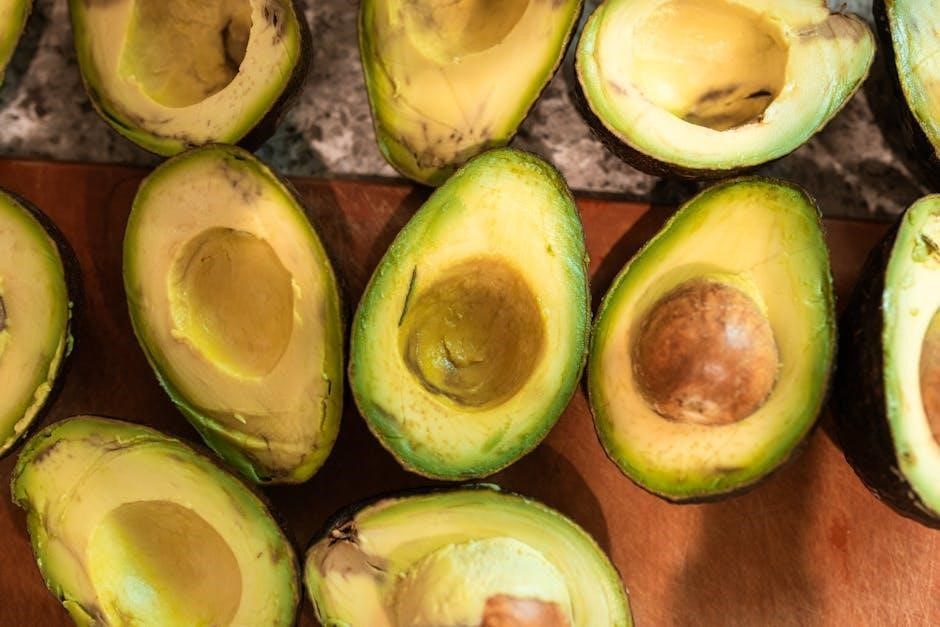
half marathon diet plan pdf
A well-structured half marathon diet plan is essential for optimizing performance, enhancing recovery, and ensuring proper fueling. It focuses on balancing nutrition, hydration, and timing to meet the demands of training and racing. This plan helps runners maximize energy levels, avoid common pitfalls, and maintain overall health. By tailoring dietary needs to individual goals and training phases, it supports peak performance and longevity in the sport.
1.1 Understanding the Importance of Nutrition for Runners
Nutrition is a cornerstone for runners, directly impacting energy production, muscle function, and recovery. A balanced diet ensures optimal fueling for training, prevents fatigue, and supports muscle repair. Proper hydration and electrolyte balance are also critical to maintain performance and avoid dehydration. Understanding how different nutrients—carbohydrates, proteins, and fats—contribute to energy stores and recovery helps runners tailor their diets. By prioritizing nutrition, runners can enhance endurance, speed, and overall performance while reducing the risk of injury and illness. A well-planned diet is essential for achieving peak performance.
The half marathon diet plan is a comprehensive guide tailored to meet the nutritional needs of runners. It focuses on pre-training, during training, race week, and post-race nutrition strategies. The plan emphasizes balanced meals, hydration, and electrolyte management to optimize energy levels and recovery. It includes sample meal plans, carb-loading techniques, and hydration tips. The diet plan also addresses common mistakes to avoid and provides long-term maintenance strategies. By following this structured approach, runners can enhance performance, reduce injury risk, and achieve their goals effectively. Proper nutrition is key to success in training and racing. Proper pre-training nutrition lays the foundation for successful half marathon preparation. It involves assessing current dietary habits, setting goals, and understanding macronutrients to fuel workouts effectively. Assessing your current diet is the first step in creating a personalized half marathon diet plan. Start by tracking your daily food intake for one week to identify patterns, strengths, and weaknesses. Pay attention to portion sizes, meal timing, and nutrient balance. Evaluate your overall calorie consumption and macronutrient distribution to ensure they align with your training needs. Consider your hydration habits and frequency of meals. This evaluation will help you pinpoint areas for improvement and create a foundation for a tailored nutrition strategy that supports your training goals effectively. Setting clear nutritional goals is essential for optimizing your half marathon training. Define specific, measurable objectives aligned with your training demands, such as increasing energy levels or improving recovery. Aim to balance macronutrients, with a focus on complex carbs for fuel, lean proteins for muscle repair, and healthy fats for sustained energy. Adjust your calorie intake to match training intensity and include hydration goals. Prioritize whole, nutrient-dense foods and consider seeking professional guidance to tailor your goals to your unique needs and preferences for peak performance. Macronutrients—carbohydrates, proteins, and fats—are fundamental for fueling your half marathon training. Carbohydrates provide quick energy, ideal for high-intensity runs, while proteins repair and build muscle tissue. Fats support long-term energy needs and overall health. A balanced ratio of these nutrients ensures optimal performance and recovery. Aim for complex carbs like whole grains, lean proteins such as chicken or fish, and healthy fats from sources like nuts or avocados. Tailoring macronutrient intake to your training phase maximizes efficiency and supports your endurance goals, ensuring you’re properly fueled for every run. A well-structured nutrition plan during training supports energy needs, aids recovery, and enhances performance. Focus on balanced meals, proper fueling, and hydration to optimize your endurance and progress. Fueling for your runs is essential to maintain energy levels and endurance. Aim to eat a balanced meal 2-3 hours before running, including complex carbs, lean protein, and healthy fats. Avoid heavy or high-fiber foods that may cause digestive discomfort. During long runs, consume energy gels or chews with water every 30-45 minutes to replenish glycogen stores. Practice your fueling strategy during training to avoid stomach issues on race day. Stay hydrated and listen to your body’s nutritional needs. Proper hydration is crucial for optimal performance and preventing dehydration. Aim to drink 8-10 glasses of water daily, increasing intake during intense training. Consume 16-20 ounces of water 1-2 hours before running and 7-10 ounces every 10-15 minutes during runs. Sports drinks can help replenish electrolytes during long runs. Monitor urine color; pale yellow indicates proper hydration. Avoid overhydration to prevent hyponatremia. Adjust fluid intake based on weather and sweat rate. Practice hydration strategies during training to ensure effectiveness on race day. Post-run recovery nutrition is essential for replenishing energy stores and repairing muscles. Aim to consume a mix of carbohydrates and protein within 30-60 minutes after your run. Chocolate milk, bananas with peanut butter, or a protein smoothie are excellent choices. These foods help restore glycogen levels and support muscle recovery. Staying hydrated is also crucial; drink water or a sports drink if electrolytes are needed. Proper recovery nutrition not only enhances performance but also reduces muscle soreness, ensuring you’re well-prepared for your next training session. Maintain consistent carbohydrate intake, avoid high-fiber foods, and stay hydrated without overloading fluids. Opt for familiar, easily digestible meals to prevent race-day stomach issues. During race week, tapering your training while maintaining balanced nutrition is crucial. Reduce calorie intake slightly to match decreased energy expenditure, but keep carbohydrate levels consistent to sustain glycogen stores. Focus on whole, easily digestible foods like lean proteins, whole grains, and vegetables. Avoid drastic dietary changes to prevent digestive issues. Stay hydrated but avoid overhydration. Listen to your body’s hunger cues and ensure meals are satisfying yet light. Prioritize familiar foods to minimize stomach discomfort and maintain energy levels for optimal race performance. Carb loading is a key strategy to maximize glycogen stores before race day. Start 2-3 days prior by increasing carbohydrate intake to 60-70% of total calories. Focus on complex carbs like whole grains, fruits, and vegetables. Reduce protein and fats to optimize glycogen storage. Spread carb intake evenly throughout the day to avoid digestive discomfort. Include high-carb foods like oatmeal, brown rice, and quinoa. Avoid new or high-fiber foods to prevent race-day stomach issues. Pair carbs with small amounts of protein for balance. Experiment during training to ensure this approach works for you. Avoid overeating the night before race day, as it can lead to digestive discomfort. Steer clear of high-fiber or unfamiliar foods that might cause stomach issues. Don’t neglect hydration—drink water regularly but avoid excessive amounts that could cause bloating. Skip caffeine and alcohol, as they can dehydrate you. Avoid trying new supplements or foods during race week to prevent unexpected reactions. Lastly, don’t forget to balance electrolytes, as their imbalance can lead to cramps and poor performance. Stick to familiar, nutrient-dense meals to ensure optimal readiness. Sample meal plans provide balanced nutrition for runners, including high-carb breakfasts, protein-rich lunches, healthy snacks, and recovery-focused dinners, ensuring sustained energy and optimal recovery. Breakfast options for runners should balance carbs, protein, and healthy fats to fuel training. Oatmeal with banana and nut butter provides sustained energy, while scrambled eggs with whole-grain toast offer protein and vitamins. Greek yogurt with berries and honey combines carbs and protein for recovery. Smoothies with spinach, frozen fruit, and almond milk are quick and nutrient-rich. Avocado toast on whole-grain bread with a poached egg adds healthy fats and fiber. These meals support energy levels and muscle repair, essential for half marathon training. For lunch, runners can opt for grilled chicken wraps with whole-grain tortillas, hummus, and veggies, or quinoa salads with lean turkey and mixed greens. Snacks like fresh fruit with almonds, energy bars, or yogurt parfaits provide quick energy. Smoothies with protein powder and spinach are also ideal. These options balance carbs, protein, and fats, ensuring sustained energy and recovery. Staying hydrated with water or herbal tea complements these meals, supporting overall training performance and digestion. Dinner should focus on recovery, with balanced meals rich in protein, complex carbs, and healthy fats. Grilled salmon with quinoa and steamed vegetables is an excellent option, as it provides omega-3 fatty acids and sustained energy. Lean beef or turkey with sweet potatoes and green beans also supports muscle repair. Avoid heavy, greasy foods that can cause discomfort. Incorporate herbs and spices for flavor without added calories. Aim to eat 2-3 hours before bedtime to aid digestion and recovery overnight. Stay hydrated with water or herbal tea to enhance nutrient absorption. Proper hydration and electrolyte balance are crucial for endurance and performance. Water regulates body functions, while electrolytes maintain fluid balance and nerve function. Aim to drink 8-10 glasses daily, adjusting for sweat loss. Include electrolyte-rich foods like bananas, dates, and coconut water. Avoid sugary drinks that can cause bloating. Monitor urine color to ensure hydration levels are optimal. Electrolytes help prevent cramps and fatigue during training and races. Plan hydration strategically to enhance performance and recovery. Customize intake based on weather and training intensity. Stay consistent to maintain peak physical condition. Electrolyte supplements can be useful during long runs when natural sources are insufficient. Practice hydration strategies during training to avoid race-day mistakes. Listen to your body and drink when thirsty, but also stay ahead of dehydration. Balance electrolyte intake to prevent overconsumption, which can lead to health issues. Hydration is a cornerstone of a successful half marathon diet plan, supporting both performance and recovery. Make it a daily priority to ensure optimal results. Tailor your hydration plan to your specific needs and training schedule. Experiment during training to find what works best for your body. Avoid alcohol and caffeine, which can dehydrate you. Incorporate hydration-rich foods like watermelon and cucumbers into meals. Track your hydration levels to stay motivated and consistent. Remember, proper hydration is as important as nutrition for achieving your half marathon goals. Stay disciplined and make hydration a habit. Celebrate small victories by staying consistent with your hydration plan. Share hydration tips with fellow runners to build a supportive community. Learn from others and adapt strategies to improve your hydration routine. Hydration and electrolytes are key to unlocking your full potential as a runner. Prioritize them in your daily routine for better performance and faster recovery. Educate yourself on the best practices for hydration to avoid common mistakes. Stay informed about the latest research to optimize your hydration strategy. Be mindful of your body’s signals to maintain proper hydration levels. Hydration and electrolytes are essential for maintaining energy levels and preventing fatigue during training. Plan your hydration strategy carefully to ensure you never run out of energy. Use hydration as a tool to enhance your training and race performance. Stay committed to your hydration plan and watch your progress improve. Hydration and electrolytes are the backbone of a successful half marathon diet plan, ensuring you perform at your best. Proper hydration is essential for maintaining physical performance and overall health. Water makes up 60% of the body and is vital for transporting nutrients, regulating temperature, and removing waste. Even mild dehydration can lead to fatigue, dizziness, and decreased endurance, negatively impacting training and race performance. Runners lose water through sweat, making consistent hydration crucial. Staying hydrated ensures optimal blood flow, delivering oxygen and nutrients to muscles. Aim to drink water regularly throughout the day, not just during runs, to stay ahead of dehydration. Proper hydration boosts energy levels, supports recovery, and prevents muscle cramps. It’s a foundational element of a successful half marathon diet plan. Electrolytes, such as sodium, potassium, and magnesium, play a crucial role in regulating fluid balance and nerve function. During intense or prolonged runs, electrolytes are lost through sweat, leading to imbalances that can cause muscle cramps, fatigue, and dizziness. To manage electrolyte balance, incorporate electrolyte-rich foods like bananas, nuts, and leafy greens into your diet. Consider using sports drinks or electrolyte tablets during long runs to replenish lost salts. Balancing electrolytes is key to maintaining performance and preventing dehydration-related issues. Proper hydration is essential for maintaining performance and safety during long runs. Aim to drink 8-10 ounces of water or a sports drink every 20-30 minutes. Start hydrating 30 minutes before your run to ensure you’re well-hydrated from the start. Monitor your urine color to gauge hydration levels—pale yellow indicates proper hydration. Avoid overhydration, which can lead to hyponatremia. Carry water or use a hydration belt for convenience. Prioritize hydration to prevent fatigue, dizziness, and muscle cramps, ensuring optimal performance throughout your training and race day. Supplements for runners can enhance performance and support recovery. Protein powder, multivitamins, and electrolytes help fill nutritional gaps, sustain energy, and improve overall training efficiency. Protein supplements are essential for runners, aiding in muscle repair and recovery post-workout. Options like whey, casein, and plant-based proteins provide necessary amino acids. They help build and maintain muscle mass, reducing injury risk and enhancing performance. Ideal for post-run recovery, they promote muscle synthesis and strength. Consistent intake supports overall training efficiency and energy levels, making them a valuable addition to a runner’s diet for optimal results in half marathon preparation. Multivitamins are crucial for filling nutritional gaps in a runner’s diet, ensuring optimal health and performance. They provide essential vitamins and minerals, such as B vitamins for energy production and vitamin C for immune support. Multivitamins help combat deficiencies, reduce fatigue, and support recovery. They are particularly beneficial during intense training phases when nutrient demands increase. By maintaining proper nutrient levels, multivitamins enhance overall well-being and help runners stay consistent in their training. Always choose a high-quality option and consult a professional for personalized recommendations. Energy gels and chews are popular among runners for quick, digestible energy during long runs. They provide fast-acting carbohydrates to maintain energy levels, especially when glycogen stores are depleted. Many products contain electrolytes to help prevent cramps and dehydration. Consuming them 30 minutes before a run or every 30-45 minutes during can sustain performance. Experiment with flavors and brands during training to avoid stomach discomfort. Choose options with minimal sugar and added nutrients for optimal benefits. Always pair with water for proper absorption and to prevent digestive issues. Developing mental strategies for nutrition involves setting clear goals, practicing portion control, and maintaining consistency. A positive mindset helps runners adhere to their diet plan effectively. Mindful eating is the practice of being fully present while consuming food, paying attention to its taste, texture, and smell. This approach helps runners develop a healthier relationship with food by reducing distractions and emotional eating. By savoring each bite, individuals can better recognize hunger and fullness cues, leading to portion control and reduced overeating. Incorporating mindful eating into a half marathon diet plan enhances digestion, supports nutrient absorption, and promotes sustainable nutrition habits for optimal performance and recovery. It fosters awareness and balance, making it easier to stick to a training diet. Emotional eating can hinder a runner’s progress by leading to unnecessary calorie intake. To avoid this, identify emotional triggers like stress or boredom and find alternatives such as walking or deep breathing. Plan meals and snacks to prevent impulsive eating. Stay hydrated, as thirst can be mistaken for hunger. Focus on nutrition as fuel for performance and maintain discipline to stay aligned with training goals. Staying motivated requires setting clear, achievable goals and celebrating progress. Track your nutrition and training improvements to visualize success. Surround yourself with supportive peers or a running community for encouragement. Reward yourself for milestones, like completing a long run, to maintain enthusiasm. Focus on how proper nutrition enhances performance and recovery, reinforcing the importance of your diet plan. Stay positive by reminding yourself of your long-term goals, and embrace small victories along the way to keep motivation high throughout your training journey. Post-race nutrition focuses on recovery, replenishing energy stores, and rehydrating. Prioritize balanced meals with carbs, protein, and antioxidants to repair muscles and restore energy levels effectively. Recovery nutrition is crucial after a half marathon to repair muscles and replenish energy stores. Aim to consume a mix of carbohydrates and protein within 30-60 minutes post-race. Carbohydrates help restore glycogen, while protein supports muscle repair. Include anti-inflammatory foods like berries and nuts to reduce muscle soreness. Hydration is also key—replenish lost fluids and electrolytes to prevent cramps and support recovery. A balanced meal with lean protein, complex carbs, and healthy fats within 2-3 hours post-race further aids in recovery and prepares the body for future training. Replenishing energy stores after a half marathon is essential for recovery and future performance. Focus on consuming complex carbohydrates like whole grains, fruits, and vegetables to restore glycogen levels. Pair these with lean proteins to support muscle repair. Aim to refuel within 30-60 minutes post-race, as this is when your body is most efficient at absorbing nutrients. Incorporate recovery-friendly foods such as bananas, smoothies, or energy bars. Properly replenishing energy stores ensures your body recovers efficiently, preventing fatigue and supporting continued training. Celebrating your half marathon achievement with a balanced meal is a great way to reward your hard work. Opt for a meal rich in lean proteins, complex carbs, and healthy fats to satisfy cravings while maintaining nutrition. Grilled chicken, quinoa, and colorful vegetables make an excellent choice. Pair it with a small portion of dessert, like dark chocolate or fresh fruit, to indulge mindfully. Stay hydrated with water or a sparkling drink infused with fruit. This approach ensures you celebrate without undoing your dietary progress, keeping you fueled and motivated for future goals. A well-structured long-term nutrition plan focuses on sustaining energy levels, supporting continuous training, and promoting overall health through balanced eating habits and strategic meal planning. A balanced diet for long-term success in half marathon training emphasizes whole, nutrient-dense foods. Focus on complex carbohydrates, lean proteins, and healthy fats to fuel performance and recovery. Include a variety of fruits, vegetables, and whole grains to provide essential vitamins and minerals. Portion control and meal timing are crucial to sustain energy levels throughout the day. Stay hydrated and avoid excessive processed foods. Tailor your diet to individual needs, preferences, and training phases to ensure consistency and optimal results over time. Caloric intake must be tailored to match training demands and weight goals. During maintenance phases, balance energy consumption with expenditure to avoid overtraining or fatigue. Adjust portion sizes based on activity levels, metabolism, and progress. A gradual reduction or increase in calories helps maintain performance without sacrificing recovery. Monitor changes in body composition and energy levels. Consulting a dietitian or coach can provide personalized adjustments. Regularly track food intake and activity to ensure alignment with goals, promoting long-term sustainability and optimal performance in half marathon training. Periodizing nutrition aligns dietary intake with training phases to optimize performance and recovery. During base training, focus on balanced macronutrients to build endurance. In the build phase, increase carbohydrate intake to support higher intensity. Peak phase emphasizes carb loading and protein for race preparation. Recovery phases prioritize replenishing energy stores and reducing calories to avoid excess. Adjusting nutrition seasonally prevents plateaus and enhances adaptation. Avoid overconsumption during low-intensity periods. Work with a dietitian to tailor plans for individual needs, ensuring peak performance and sustained energy levels throughout training cycles. A well-structured half marathon diet plan ensures optimal performance, recovery, and overall health. Consistency, balance, and proper timing of meals are key to success. Stay committed, listen to your body, and celebrate small victories. With dedication and the right nutrition, crossing the finish line becomes achievable. Remember, nutrition is a personal journey—customize your plan to suit your needs and goals for long-term success. A successful half marathon diet plan revolves around balanced nutrition, proper hydration, and tailored strategies for each training phase. Prioritize complex carbs, lean proteins, and healthy fats to fuel runs. Hydration and electrolyte balance are critical for performance and recovery. Carb loading and post-run nutrition maximize energy replenishment. Avoid common mistakes like overeating or neglecting electrolytes. Mental strategies, such as mindful eating, enhance consistency. Customization and periodization ensure long-term success. By adhering to these principles, runners can optimize performance, recover efficiently, and achieve their goals. Consistency and patience are key to a half marathon diet plan. Listen to your body and adjust portions based on training demands. Plan meals in advance to avoid unhealthy choices. Stay hydrated daily and practice race-day nutrition during long runs. Trust the process and avoid last-minute dietary changes. Celebrate small victories and stay committed. Remember, nutrition is a long-term investment in performance and recovery. With dedication and the right fuel, you’ll cross the finish line strong and confident. Remember, every step forward in your diet and training is progress. Celebrate small victories and stay focused on your goals. Surround yourself with supportive people who encourage your journey. Keep learning and adapting your nutrition plan to optimize performance. Believe in your ability to improve and push through challenges. Consistency and patience will yield long-term results. Stay committed, and your hard work will pay off on race day and beyond. You’ve got this—keep shining! Explore books, websites, and downloadable guides for further insights into half marathon nutrition. These resources offer expert tips, meal plans, and training advice to enhance your journey. Check out The Runner’s Diet by Stephen McGregor for tailored nutrition plans. Nutrition for Runners by Matt Fitzgerald offers practical meal strategies. Endurance Sports Nutrition by Suzanne Girard Eberle provides scientific insights. The Plant-Based Runner by Matt Frazier is ideal for vegan athletes. These books cover meal planning, hydration, and recovery, ensuring a well-rounded approach to fueling your training and race performance. They are available in PDF formats for easy access and reference. Visit Runner’s World for expert nutrition tips. Active.com offers meal plans and training advice. MyFitnessPal helps track calories and macros. Academy of Nutrition and Dietetics provides evidence-based guidance. These websites are excellent resources for creating a personalized half marathon diet plan. They offer recipes, hydration tips, and training-specific nutrition strategies to optimize your performance and recovery. A comprehensive half marathon diet plan PDF is available for download, offering a structured approach to nutrition. This guide includes meal plans, hydration schedules, and recovery strategies tailored for runners. It also provides grocery lists and recipes to simplify meal prep. The PDF is customizable, allowing you to adjust portions and food preferences based on your needs. Download it for a clear, evidence-based plan to fuel your training and race day performance effectively.1.2 Overview of the Half Marathon Diet Plan

Pre-Training Nutrition
2.1 Assessing Your Current Diet
2.2 Setting Nutritional Goals
2.3 Understanding Macronutrients
During Training Nutrition
3.1 Fueling for Your Runs
3.2 Hydration Strategies
3.3 Post-Run Recovery Nutrition

Race Week Nutrition
4.1 Tapering and Nutrition
4.2 Carb Loading Strategies
4.3 Avoiding Common Nutrition Mistakes

Sample Meal Plans

5.1 Breakfast Options for Runners
5.2 Lunch and Snack Ideas
5.3 Dinner Recipes for Recovery

Hydration and Electrolytes
6.1 Importance of Proper Hydration
6.2 Managing Electrolyte Balance
6.3 Hydration During Long Runs

Supplements for Runners
7.1 Role of Protein Supplements

7.2 Benefits of Multivitamins
7.3 Energy Gels and Chews

Mental Strategies for Nutrition
8.1 Mindful Eating
8.2 Avoiding Emotional Eating
8.3 Staying Motivated
Post-Race Nutrition
9.1 Recovery Nutrition
9.2 Replenishing Energy Stores
9.3 Celebrating with a Balanced Meal
Long-Term Nutrition Plan
10.1 Maintaining a Balanced Diet
10.2 Adjusting Calories for Maintenance
10.3 Periodizing Nutrition
11.1 Summarizing Key Points
11.2 Final Tips for Success
11.3 Encouragement for Continued Improvement

Additional Resources
12.1 Recommended Reading
12.2 Useful Websites
12.3 Downloadable PDF Guide